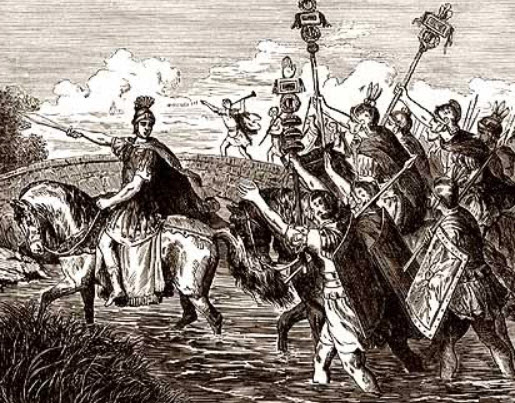2 Comments to 'Crossing the Rubicon'
Subscribe to comments with RSS
:: Trackbacks/Pingbacks ::
-
Trackback by My Homepage -

In one of those strange coincidences in life, a Book club I attend has been doing the wonderful course from Hillsdale College on the Rise and Fall of the Roman Republic, reading selections from ancient historians such as Plutarch, Livy, and Polybius. This past week we covered Julius Caesar and the Collapse of the Roman Republic. (The Rise and Fall of the Roman Republic | Hillsdale College Online Courses). Thus I was somewhat surprised to hear a number of commentators talk about the indictment of Trump as the Democrats, “crossing the Rubicon.” It was a scary, and not a completely unwarranted, reference.
To be sure, Julius Caesar did not cause the Roman Republic to collapse, but he was the one who brought down the final curtain. Historians still debate whether this was his intention, and thus the act of a dictator, or an unfortunate side effect of his actions, and thus the failed attempt of a savior. But end the Republic he did, launching, after 400 years of Democracy, the 400-year Roman Empire.
Roman Democracy had been in serious trouble and decline for about 90 years. This period was marked by many factors. Rather than working together, the period saw increasing polarization. In this was the growing prominence of individuals as power moved away from institutions like the Senate and Assembly to these individuals. Political power rested with the masses, the Plebs, and this power was gained through giveaways, such as reduced or even free food and entertainment, which after 105 B.C. included gladiatorial games. Bread and Circuses.
A key factor was the breakdown of law. As power became more important than persuasion, the rules and tradition became less important. After a while, all the younger generation knew, was not following long-established norms and traditions, many of which were no longer even remembered, but pushing the boundaries to see what you could get away with. The most successful could push a lot.
Thus, the courts ceased to be sources of justice but another forum where political power could be wielded. It did not matter whether you were guilty or innocent as much as whether your side or the opposition controlled the courts. As a result, the courts came to be something used against political foes. Rather than looking for crimes and then trying to find culprits, they targeted political opponents and then looked for a crime.
With Julius Caesar, all these problematic trends came to a head. Caesar had been a powerful political force when he secured command of the army in Gaul, modern-day France. That was 10 years ago. Now he was ready to return to Rome and run for the office of consul, having added the prestige of being a successful general to all his other accomplishments.
This greatly troubled his political opponents, who feared he would be unstoppable. While a general in Gaul, or a consul in Rome, he was immune from prosecution. But, between the time he left Gaul and won the election, he would be vulnerable to prosecution in the courts. There were several ways to manipulate the events to avoid this, but his opponents could play at that game too, and they were in Rome. So they blocked all his efforts.
When they got the Senate to declare Caesar an enemy of the state, he was left with little choice. On January 10, 49 B.C., he crossed the little creek in Northern Italy that then marked the border with Gaul, the Rubicon, and came to Rome. But he did not come alone. He came with his Army bringing down the last façade of the Republic.
There are a lot of differences between then and now. But there are disturbing parallels as well. We have the increasing polarizations and the growing importance of individuals over parties. Politics is increasingly moving into the courts. The Democratic prosecutor in Trump’s case ran with going after Trump as a significant part of his campaign, the classic example of targeting a person and then seeking a crime. The reverse of the rule of law.
With Trump as a candidate for President, attempting to defeat a Democratic President, a democratic prosecutor should only do this as a last resort and only in the most serious of cases with the clearest evidence. Yet here, for some reason, the indictment is sealed. All we have are leaks.
If the leaks are correct, and they may not be, he is being indicted on a charge for which the statute of limitation has run out. Supposedly, to get any sort of case, he had to twist it into a federal charge that federal prosecutors had refused to pursue and which other politicians, most notably Hilary Clinton, only received a fine. The sort of fine that campaigns routinely get assessed, and nobody worries much about. Yet he indicted Trump.
So why was Trump indicted? The very act raises huge questions and concerns. To do this in a secret inditement only makes it worse. The prosecutor could resolve these concerns quickly by unsealing the inditement and explaining his rationale. Yet, as I write this, he refuses to say anything other than criticize any who claim his actions look political.
We can only hope the indictment is released very quickly and that it is rock solid and not a convoluted charge aimed more at fulfilling a campaign promise and getting a mug shot than a conviction for a serious crime. Unfortunately, that is what it appears now.
If it is what has leaked, while we have not crossed the Rubicon, we have at least moved much closer to it.
Subscribe to comments with RSS
:: Trackbacks/Pingbacks ::
Trackback by My Homepage -
38560 45336Thank you pertaining to giving this outstanding content on your web-site. I discovered it on google. I might check back once more in the event you publish extra aricles. 639523